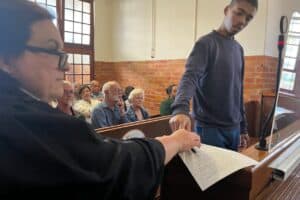She pointed out that according to the World Bank, South Africa was the most unequal country in the world.

The South African judiciary has performed admirably as the ultimate guardian of the Constitution, at times “clutching us from the brink of catastrophe”, said former public protector Professor Thuli Madonsela said in her inaugural lecture at Stellenbosch University on Monday.
“However, the jurisprudence is not consistent, and at times, it’s indifferent to the circumstances of ordinary people, with the impact of reinforcing social and economic disparities,” she told the packed Adam Small Theatre Auditorium.
Madonsela said in her lecture, titled Judicial Review Through a Social Justice Lens, that social injustice was a great threat to democracy.
“What happens if we don’t fix injustice? When the edifice is compromised, what happens? You get that – [state capture].
“While the rule of law is important in justice – including social justice – prevailing social injustice is a great threat to democracy.”
Social justice was not socialism, Madonsela said.
“The definition is essentially about the equal enjoyment of all rights and freedoms regardless of human diversity reflected in a fair and just distribution of all opportunities, resources, benefits, privileges, and burdens in a society and between groups,” she explained.
According to the World Bank, South Africa was the most unequal country in the world, Madonsela pointed out.
Poverty had increased instead of decreasing since 1994 and unemployment also continued to rise, she said.
“1% of people in the white community is poor, 63.2% of people classified as Africans are poor and 37% of coloureds are poor.
“There is inequality in terms of access to assets, and most financial institutions require collateral.”
This meant that poor people struggled especially to have a house, some despite being on the government housing list as far back as 1996.
Madonsela, the chairperson of social justice research at the university’s law faculty, proposed, among others, a review of administrative law judgment in the last 25 years focusing on “patterns and impact on the broader, transformative constitutional project”.
She called for the establishment of administrative courts, as well as an electronic source system for administrative court judges to share information and ensure there was consistency in decisions and access to justice.
Madonsela also urged that “everyday justice education” be provided to the public on administrative justice, its implications and how to use it to “make democracy work for them and for all”.
“Justice holds society together. When justice fails, the fabric of society cannot hold.
“Courts have much potency to play their part not only in holding society together, but in delivering a new society where democracy works for all and no one is left behind.”
For more news your way, download The Citizen’s app for iOS and Android.






